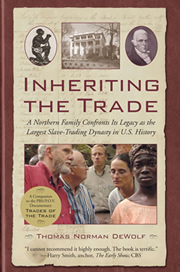Wed 2 Sep, 2009
Tom DeWolf on health care and race
Comment now Filed under: Thinking about race, privilege and inequality| Tags: Health and health care, Inheriting the Trade, Racial inequality, Tom DeWolf |
My cousin Tom DeWolf has an essay up on his blog about race and health care. Tom is discussing health care reform this week, and this essay examines racial disparities in health care and health outcomes.
Tom reports that on average, white Americans are healthier and live longer than black Americans. They also receive considerably more health care, even when factors like income or health insurance are taken into account. Tom acknowledges that the causes are complicated, but he makes a powerful argument that when it comes to health and health care, race still matters in our society.
 Regular readers of this blog know that my distant cousin, Tom DeWolf, has written
Regular readers of this blog know that my distant cousin, Tom DeWolf, has written 
